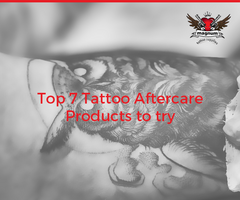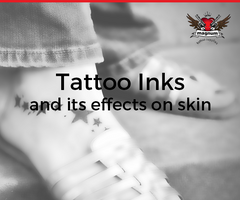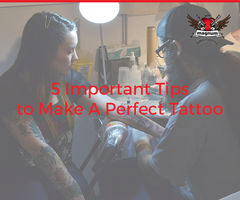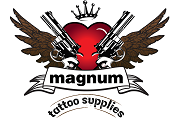Top 7 Tattoo Aftercare Products to Try 0

Maintaining the look of your tattoo may seem easy, but just like any other things... tattoos fade after a certain time. This is why manufactures in the tattoo industry came up with tattoo aftercare products to help heal your tattoo while maintaining it's vibrancy.
Here are some of the best tattoo aftercare products for healing, moisturising and enhancing the look of your tattoos.
1. Tattoo Goo original aftercare salve 3/4 Ounce tin
This aftercare product comes from 100% natural ingredients. It is made with herbs, vitamins, and oils known for their healing properties. Using this product allows the skin to breathe and soothe during your tattoo's healing process. Tattoo Goo original aftercare salve is also useful for the skin that is damaged, chapped, scraped and sun or wind burned.
2. Landerm transparent film tattoo aftercare
Landerm transparent film adhesive tattoo dressing keeps your skin away from water, germs and dust while still letting your skin breathe. It is a hypoallergenic adhesive protective barrier designed to speed up recovery of your new tattoo. It's an adhesive dressing that is also light and flexible that provides ultimate comfort. It can also be cut out to adjust to the tattoo size.
3. Ink Fixx tattoo aftercare ointment
Ink Fixx Tattoo aftercare ointment is one of the highest rated tattoo aftercare product on Amazon. It contains all of the necessary vitamins and minerals needed to allow the tattoo to heal fast and naturally. This ointment should be applied daily for your tattoo to avoid cracking, scabbing, or peeling. It also helps to avoid your tattoo’s colour to fade. It is completely based on natural ingredients, making it gentle on skin.
4. Tattoo Goo’s tattoo Kit
Getting the whole kit gives you a great deal. With an affordable price, this tattoo aftercare kit consists of five different products made by Tattoo Goo. Among these five aftercare products are moisturising lotion, soap, ointment, and a lot more. The kit is proven to be one of the best products that can heal your new tattoo. You can use it as skin moisturiser, tattoo healer, soother and infection preventer.
5. H2Ocean Extreme tattoo care kit
This product is one of the most recommended tattoo aftercare products by tattoo professionals worldwide. The 3- step ointment based system is known for its first aid healing process. Just like any other aftercare product, it keeps and protects the colour of your tattoo for a long time.
6. After Inked Tattoo Moisturiser and aftercare lotion
After Inked product is made to moisten your new and existing tattoo. This all- natural product helps your tattoo look and feel healthier. It is also non-petroleum based, paraben-free, fragrance-free, vegan, cruelty-free and gluten-free. This clinically- tested product is safe on all skin types, and is non- irritant.
7. A&D Ointment Element tattoo aftercare medical supply
Inside the package are 144 individual packs. It is used during the tattooing process as a skin moisturiser but it can also be used as a tattoo aftercare lubricant / moisturiser.
Tattoo Inks and its effects on skin 0

They say wear your heart on your sleeve, but other people choose to wear it on their skin. For some, tattoos are a way of expressing a part of who they are. Aside from that, tattoo is a great form of art. Having a tattoo may not be everyone’s cup of tea because of the risks that come with it. With so much articles written online, it's pretty confusing which ones to take seriously. One of the commonly discussed factor that scares most people who haven't had a tattoo is the ink and the components used to create it.
Tattoo ink is a liquid that contains one or more colourants and other ingredients in the form of adjuvants, such as binding agents, additives and solvents. It is abundant of different chemicals. This is why every tattoo ink is different and might have different effects on the skin. If you get two tattoos in the exact shade, but get them at different times and from different artists who use different inks the chemical compositions probably won’t match. Tattoo inks include pigments, which can contain a variety of metallic salts, like oxides, selenides, sulfides, organic dyes, or plastics, and the carriers with which they are mixed to help provide an even application of the ink.
Inks are usually either alcohol-based or water-based. It may include ethanol, methanol, and glycerin products as mediums for transferring the pigments in the inks. Below are some of the benefits that these types of tattoo inks contain.
- Non- toxic inks
Non- toxic inks are made from organic pigments. It has been developed recently, after certain chemicals previously used to make traditional tattoo inks were linked to cancer. This type of tattoo ink is different since their pigments are all made from ingredients that come straight from nature.
- Water based tattoo inks
Water- based inks produce flexible, dynamic pigments in reliably bold, beautiful colours.
- Vegan tattoo ink
Another type of tattoo ink that is now popular to the majority is the vegan tattoo ink. These inks don’t use any type animal by-products for colour or carrier solutions. Using a vegan tattoo ink is beneficial because it lasts longer compared to regular inks. The ink does not contain chemicals that are harmful for your skin, and for your tattoo artist's health. Research also shows that tattoos with vegan and non-toxic inks have faster healing time because of it's natural ingredients.
- Glow in the dark and backlight tattoo ink
Both inks have been used for tattooing. Glow in the dark ink absorbs and retains light and glows in darkened conditions by the process called phosphorescence. Blacklight ink does not glow in the dark, but reacts to non-visible UV light, which produces a visible glow by fluorescence.
- Black henna
Black henna is normally applied externally for temporary “Mehandi” tattoos, rather than being injected beneath the skin as a permanent tattoo. It is a temporary tattoo that has an ingredients that can also be found on hair dyes.
5 Traits a Successful Tattoo Artist Should Have 0

Like any other business, running a tattoo shop or a tattoo parlour isn't easy. It is a very competitive industry to be in. To become successful in this industry, one must have passion, perseverance, and determination. But the main factor that will impact a tattoo business is its tattoo artists.
Being a successful tattoo artist does not happen overnight, heck it doesn't even happen in a year! Skills should not only be learned but mastered. Artists should also familiarise themselves with the equipment, and other tools to be used before, during, and after the tattoo process.
Here are 5 traits a tattoo artist should have to excel in this field.
1. Artistic Ability
Even if you're not a natural-born artist, certain skills, techniques and styles can be practised and mastered to improve your existing abilities. People who love tattooing and have passion for the art are most likely to succeed in this field. Like a painter with a canvas and paintbrush, a tattoo artist has a tattoo machine and the client's skin.
2. Attention To Detail
This skill is one of the most important things a tattoo artist needs to master. Artists should learn to keep an eye on even the most minor details when working. Listen carefully to what your client wants and keep in mind all their requests.
3. Curiosity
Nothing is constant except change, this is also applicable to the tattoo industry. New tools and techniques are developed year after year. Keeping up with new techniques, trends, and new tools is important to survive in the industry. This is where curiosity helps big time. Just because an artist knows a lot, doesn't mean they need to stop learning and finding out new things. Artists should be curious, read magazines, attend trade shows, learn other countries' tattoo culture, and speak with other experts. This will not only keep them up to date, this will also help them become a better artist than they were before.
4. Work Ethic
Every professional needs to follow proper work ethics, yes even tattoo artists. This will definitely help them earn respect in the industry. People will see them as someone who's reliable, trustworthy, and efficient in their craft.
5. Adaptability
The road to becoming a successful tattoo artist requires being able to adapt to your environment. Tattoo artists should have the ability to work with all kinds of people. Clients and other tattoo artists or tattoo owners will have different opinions, and ideas. You need to be able to relate to them, and communicate with them in a professional manner.
As I have mentioned earlier, a lot of changes happen day after day. New tools and equipment are introduced by different manufacturers. Different inks are being developed, and trends change from time to time. As a tattoo artist, you have to be able to adapt to these changes or else you'll get left behind.
5 Important Tips to Make A Perfect Tattoo 0

A perfect tattoo isn't that easy to achieve, but with the right elements and skills, you can definitely pull off a perfect tattoo.
To accomplish this ultimate goal, keep these 5 important tips in mind.
1. Listen to your client
Different clients have different tastes. Some want a detailed tattoo, while others choose simpler ones. Whatever your client prefers, listening to their wants and needs is very important. Communicating with your client is important before and during the tattoo process. Coming up with an actual design based on what they want will depend on your creativity and skills. Draft the design and show it to your client, be open to their comments. Don't hesitate to suggest an idea, if you think it will improve the design. If the design or the size is not feasible, explain it to your client, tell them the reasons why you don't recommend it, and offer them alternatives.
2. Pay attention to placement
The design shouldn't be the only focus to achieve a perfect tattoo. Most of the time, clients already know the design and placement they want. As the expert, you should be able to tell whether the design and size will fit the placement they have chosen. If not, don't hesitate to tell them. You can suggest other better placements, or you can suggest adjusting the size of the design. Explain to them and show them the possible outcome if they insist the placement and size they want.
3. Consider techniques in advance
Tattoo sessions are usually pre-booked, this gives you an opportunity to study and consider techniques you can use that will give you the best approach. You can even try sketching and using coloured pens to give you a better idea on how you can give justice to your client's chosen design.
4. Get to know your equipment
Of course, if you're planning to make this a career you should know every equipment by heart. You should be comfortable with the equipment you will be using. Being uncomfortable with your equipment will affect the overall result of your work. Familiarise your self with all the equipment you will be using, and the brand of ink you choose to use. This will give you overall control during the tattoo process.
5. Be realistic.
A good tattoo artist knows their limitations. Knowing is one thing, but admitting and accepting these limitations is different. But that shouldn't stop you from learning and practising new techniques. But if you're not ready, and you know you're not confident that you can achieve the client's desired design, say it to them directly. Accepting projects that are beyond your limitations might lead to a disastrous outcome. You don't want an unhappy client right? Be realistic and be honest. Keep in mind that customers worked hard to save money for their tattoos and they also endure the pain, so they don’t want to end up leaving your shop dissatisfied and traumatised.
5 Important Tips to Make A Perfect Tattoo 0

A perfect tattoo isn't that easy to achieve, but with the right elements and skills, you can definitely pull off a perfect tattoo.
To accomplish this ultimate goal, keep these 5 important tips in mind.
- Listen to your client
Different clients have different tastes. Some want a detailed tattoo, while others choose simpler ones. Whatever your client prefers, listening to their wants and needs is very important. Communicating with your client is important before and during the tattoo process. Coming up with an actual design based on what they want will depend on your creativity and skills. Draft the design and show it to your client, be open to their comments. Don't hesitate to suggest an idea, if you think it will improve the design. If the design or the size is not feasible, explain it to your client, tell them the reasons why you don't recommend it, and offer them alternatives.
- Pay attention to placement
The design shouldn't be the only focus to achieve a perfect tattoo. Most of the time, clients already know the design and placement they want. As the expert, you should be able to tell whether the design and size will fit the placement they have chosen. If not, don't hesitate to tell them. You can suggest other better placements, or you can suggest adjusting the size of the design. Explain to them and show them the possible outcome if they insist the placement and size they want.
- Consider techniques in advance
Tattoo sessions are usually pre-booked, this gives you an opportunity to study and consider techniques you can use that will give you the best approach. You can even try sketching and using coloured pens to give you a better idea on how you can give justice to your client's chosen design.
- Get to know your equipment
Of course, if you're planning to make this a career you should know every equipment by heart. You should be comfortable with the equipment you will be using. Being uncomfortable with your equipment will affect the overall result of your work. Familiarise your self with all the equipment you will be using, and the brand of ink you choose to use. This will give you overall control during the tattoo process.
- Be realistic.
A good tattoo artist knows their limitations. Knowing is one thing, but admitting and accepting these limitations is different. But that shouldn't stop you from learning and practising new techniques. But if you're not ready, and you know you're not confident that you can achieve the client's desired design, say it to them directly. Accepting projects that are beyond your limitations might lead to a disastrous outcome. You don't want an unhappy client right? Be realistic and be honest. Keep in mind that customers worked hard to save money for their tattoos and they also endure the pain, so they don’t want to end up leaving your shop dissatisfied and traumatised.
Things you should know about Tattoo Anaesthetics 0

Most people get addicted to getting a tattoo because of the pain they feel during the tattoo process. Others want to get a tattoo to overcome emotional pain and diverting it to physical pain. But not everyone wants to get a tattoo and feel the needle penetrate their skin. Some even doubt themselves whether they can handle the pain or not. Fortunately, tattoo product manufacturers have come up with a solution to cater to those who are dying to get a tattoo but have low pain tolerance. There are tattoo anaesthetic sprays, numbing creams, and anaesthetic gels available in the market. Tattoo artists have been using these anaesthetics for a long time.
There have been a lot of questions and speculations about these tattoo anaesthetics. And we would like to answer some of those questions for you and for others who are scared to get a tattoo because of their low tolerance to pain.
- Do tattoo anaesthetics really work? Yes, of course! These products can be very effective. However, not all anaesthetics are created equally. If you own a tattoo shop, and you want to offer tattoo anaesthetics to your client, be sure to look for the following ingredients when buying tattoo anaesthetics: lidocaine, tetracine, benzocaine, and/or epinephrine. Menthol, camphor, tea tree oil, and comphrey roots are some of the natural additives that help enhance the power of the anaesthetics.
- How do they work? Lidocaine, one of the numbing agents mentioned earlier, can be found in nearly every tattoo anaesthetic product. The higher the percentage of lidocaine, the more effective it will be. It deadens the nerve endings and makes the tattooing process more comfortable for both the artist and the customer. Also, lidocaine is a key ingredient in reducing the initial stings of a tattoo needle when it hits the skin. It prevents the client from flinching too much. There are also products that contain tetracine or benzocaine, if not both. These are nerve blockers. They do not totally put a stop to nerves from sending pain signals to the brain, but they lessen the level of discomfort that those pain signals can give. There's also, epinephrine, a vasoconstrictor that causes the blood vessels to be narrower to have less bleeding and swelling during the tattooing process. However, be too much of these can cause complications.
- What is the most effective combination of tattoo anaesthetics? Some tattoo anaesthetics take effect faster than others, which makes them perfect as boosters to apply as secondary layers throughout the whole tattooing process. When you are using a tattoo anaesthetic that contains epinephrine, it won't be necessary to reapply it, one layer is enough. Also, try to use tattoo anaesthetics like Tattoo Soothe Cream or Hush anaesthetic gel. During the preparation of the skin for the tattooing process, wash client’s skin with products like H2Ocean’s Nothing Pain-Relieving Foam Soap enhanced with Bactine. The Bactine will help in reinforcing the effects of any topical anaesthetic applied beforehand.






